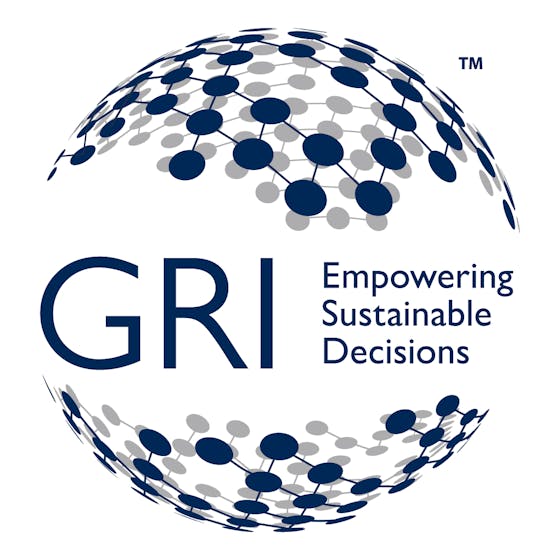The Global Reporting Initiative (GRI) - responsible for the most widely used sustainability reporting standard for businesses - on Tuesday unveiled a new five-year plan which expands its priorities beyond setting guidelines to helping businesses and policymakers use data from the process make more sustainable decisions.
To continue reading, subscribe to Eco‑Business.
There's something for everyone. We offer a range of subscription plans.
- Access our stories and receive our Insights Weekly newsletter with the free EB Member plan.
- Unlock unlimited access to our content and archive with EB Circle.
- Publish your content with EB Premium.

GRI’s new brand image, unveiled on Tuesday. Image: GRI
The Amsterdam-based non-profit, which also unveiled a new brand logo with its strategic roadmap, helps organisations report their economic and environmental, and social performance by providing a common framework.
In coming years, the organisation will focus on four new key areas.
First, it will work with governments, markets, and international organisations to enable policies which address climate change, human rights, corruption, and other issues.
Second, it will continue to encourage more organisations to begin sustainability reporting, and encourage companies that are already on board to improve the quality of the reporting.
GRI’s third priority is to capture more value from the reporting process than just what is presented in sustainability reports. It aims to make this data widely accessible, and work with technology and data companies to present it in ways that are useful to investors, customers, civil society organisations, citizens, and governments.
“
As the cornerstone of sustainability reporting, GRI has a responsibility to work with its global community to innovate for a future where sustainability is integral to every decision-making process.
Christianna Wood, chairman, GRI board
The final area of focus, innovation and collaboration, will see GRI working with organisations in the reporting field to drive improvements in reporting quality, and working with the world’s leading technology and data companies to develop ways to make sustainability information more accessible, comparable, and available in real-time.
The impact of these new priorities will certainly be felt in Asia, which is the world’s fastest-growing region for sustainability reporting, said GRI deputy chief executive Teresa Fogelberg.
GRI’s work in Asia in the near future will focus on building sustainability reporting capacity, supply chains, anti-corruption, climate change and human rights, Fogelberg told Eco-Business.
These issues are crucial considerations for the region as it continues its rapid economic growth, and organisations look for a competitive edge in local and global markets, she noted.
“Vietnam, Indonesia, and the Philippines are priority countries for GRI over the next several years,” she shared, adding that GRI will also continue its ongoing work with businesses and stock exchanges in Hong Kong, Taiwan, Singapore, and China.
The organisation has worked with Chinese and Indian government agencies to promote dialogue around sustainability reporting, and helps stock exchanges worldwide - including in Singapore - establish reporting policies by providing training for senior executives.
GRI also conducts workshops across Asia to help civil society organisations, investors, and the media use sustainability data that is reported by companies more effectively - a move it says will improve the flow of information between reporting organisations and data users.
GRI’s reporting standard, first launched in 2000, is developed by experts from companies, civil society, labour organisations, academia, and finance. The guidelines have since undergone four revisions and the most recent version, known as the G4, was released in 2013.
Thousands of companies in more than 90 countries use GRI standards for their sustainability reporting, including a majority of the world’s largest 250 corporations.
The new priorities set out by GRI build on ongoing efforts to use the sustainability reporting process to drive policy change.
Christianna Wood, chairman of the GRI board, said that since GRI was launched 18 years ago, it has constantly evolved to keep pace with the changing global conversation on sustainability issues.
“As the cornerstone of sustainability reporting, GRI has a responsibility to work with its global community to innovate for a future where sustainability is integral to every decision-making process,” she added.










